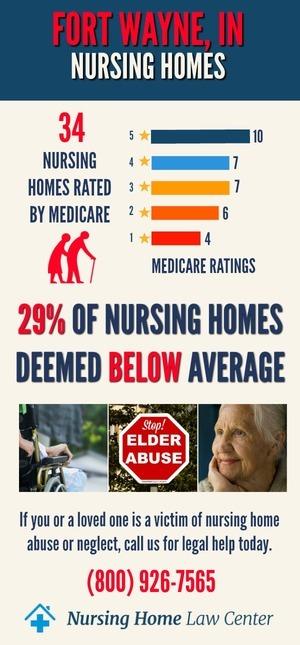The Nursing Home Law Center is committed to providing the legal resources necessary to hold negligent facilities accountable.
Fort Wayne Nursing Home Abuse Lawyer

Licensed in Indiana
Nursing home abuse is an unfortunate reality that affects vulnerable individuals in Fort Wayne and across the country.
When elderly residents enter a nursing home, their families trust the facility to provide the care and respect their loved ones deserve. Unfortunately, not all nursing homes fulfill their duty, and nursing home abuse can take many forms, from physical and verbal abuse to financial exploitation and neglect.
If you suspect that your loved one is suffering from abuse or neglect in a nursing home, it’s essential to seek legal help immediately. An experienced Fort Wayne nursing home abuse and neglect lawyer can help you understand your legal rights, build a strong case, and pursue justice for your loved one’s injuries.
Why Hire Nursing Home Law Center
At Nursing Home Law Center, we are dedicated to pursuing justice and fair compensation for those impacted by nursing home abuse. Our skilled legal team has a strong history of handling these cases with care and successfully securing meaningful settlements and verdicts.
We conduct detailed investigations to cover every aspect of the abuse, including medical costs, emotional distress, and other damages. With our extensive experience in nursing home abuse claims, we manage the legal process efficiently and work relentlessly to safeguard your rights.
Throughout the nursing home abuse case, we offer compassionate and clear communication, ensuring you and your loved ones stay informed, supported, and confident at every stage.
Types of Cases Handled by Our Fort Wayne Nursing Home Abuse Lawyers

Nursing home abuse encompasses any intentional or negligent act that causes harm or distress to a nursing home resident. Abuse can take many forms, and our Fort Wayne nursing home abuse lawyers handle a variety of cases to ensure victims and their families receive justice.
Physical Abuse
Physical abuse involves any intentional act that causes physical pain to a resident, including hitting, slapping, or misusing restraints. Many nursing home residents suffer from bruises, broken bones, and other bodily injuries that may be a result of physical abuse by a nursing home staff member.
Mental and Emotional Abuse
Psychological abuse includes verbal assaults, threats, humiliation, or isolation that can cause psychological harm. Victims of emotional and mental abuse may exhibit signs of anxiety, depression, or withdrawal from social interactions.
Sexual Abuse
Sexual abuse in nursing facilities refers to any non-consensual sexual contact or harassment of a resident. This type of abuse often results in both physical injuries and deep emotional trauma, and it can sometimes be difficult to detect without close monitoring.
Medical Malpractice
Medical negligence occurs when nursing home staff members or medical professionals fail to provide the appropriate standard of care, leading to harm. This includes bedsores, medication errors, untreated infections, or failure to manage chronic conditions. Victims of medical malpractice may suffer from worsened medical conditions or serious injuries due to neglect.
Negligence
Nursing home neglect is a common form of abuse that occurs when caregivers fail to provide necessities, such as hygiene, nutrition, hydration, or medical care. This neglect can result in poor hygiene, malnutrition, dehydration, or even elopement (residents wandering away unsupervised), all of which can lead to severe health complications.
Financial Abuse
Financial exploitation in medical facilities involves manipulating or coercing a resident to hand over their personal belongings, money, or assets. This exploitation can also include suspicious changes to wills or financial documents. Unusual financial transactions are often red flags for financial abuse.
Wrongful Death
In the most tragic cases, nursing home abuse or neglect can result in the death of a resident. The family can file wrongful death claims to seek justice and compensation for the loss of their loved one.
Understanding Your Legal Rights
Nursing home patients have specific legal rights protected by state and federal regulations.
One of the most important federal laws is the Nursing Home Reform Act of 1987, which establishes standards for the care nursing homes must provide. This law ensures that nursing home patients receive adequate medical care, live in a safe environment, and are free from abuse and neglect.
In addition to federal laws, Indiana has its own regulations that govern nursing homes offering Medicaid services, overseen by the Indiana State Department of Health. These laws ensure that nursing homes maintain proper staffing levels, conduct regular health inspections, and provide appropriate care to residents.
Residents themselves can file medical malpractice claims, or a family member or legal guardian can file on their behalf if the resident is unable to do so. In cases of wrongful death, surviving family members may seek compensation for their loss through a claim.
Liability in Nursing Home Neglect and Abuse Cases
In nursing home abuse cases, multiple parties can be held liable depending on the circumstances. Here are some common examples:
- Nursing Home Facility: The negligent nursing home can be held responsible for failing to properly train staff, maintain safe conditions, or report and address suspected abuse.
- Nursing Home Staff Members: The individual nursing home staff member who abuses or neglects residents can be held personally liable for their actions.
- Medical Professionals: In cases of medical negligence, doctors, nurses, and other healthcare professionals who fail to provide appropriate care can be held accountable for the harm they cause.
- Third-Party Contractors: Outside contractors or vendors may also be liable if their negligence contributes to unsafe conditions or harm to nursing home patients.
How Our Fort Wayne Nursing Home Abuse Lawyers Can Help
There are 45 Medicare-certified nursing homes in Fort Wayne, and 14 facilities (31%) are struggling with their overall ratings and inspections.
12 facilities, or 27%, scored poorly in health inspections, suggesting issues related to compliance with state and federal health regulations that could potentially affect residents’ well-being.
Staffing levels are a critical concern, with 31 nursing homes (69%) receiving below-average ratings. These staffing deficiencies may reflect difficulties in providing consistent, adequate care for residents, impacting their day-to-day well-being and long-term health.
Four nursing homes (9%) received low ratings regarding quality measures. This score indicates that while staffing and inspections are problematic, most facilities still perform reasonably well in maintaining residents’ overall quality of care. [1]
The worst-rated nursing homes in Fort Wayne include:
| Celebrate Senior Living of Fort Wayne | Chateau Rehabilitation and Healthcare Center |
| Envive of Huntington | Majestic Care of Jefferson Pointe |
| Sage Bluff Health & Rehab Center | Waters of Columbia City Skilled Nursing Facility |
Our Fort Wayne nursing home abuse lawyers have extensive experience handling cases of abuse, neglect, and medical malpractice. We are committed to helping families get the justice and compensation they deserve. Here’s how we can help:
- Free Case Evaluation: We offer a free consultation to discuss the details of your case, answer your questions, and help you understand your legal options.
- Case Investigation: Our legal team conducts a thorough investigation into the allegations of abuse, including reviewing medical records, interviewing witnesses, and gathering evidence to support your claim.
- Filing the Claim: Once we have gathered sufficient evidence, we will file a personal injury lawsuit on your behalf to seek compensation for medical bills, pain and suffering, and other damages.
- Settlement Negotiation: We work to negotiate a fair settlement with the nursing home or its insurance company. We are fully prepared to take your case to trial if a settlement cannot be reached.
- Trial Representation: Our nursing home neglect attorneys have a strong track record of success in the courtroom and are prepared to fight for your rights at trial if necessary to secure the compensation your family deserves.
Common Signs of Elder Abuse Among Nursing Home Residents
Family members should be aware of the common signs of nursing home abuse and neglect, which include:
- Unexplained physical injuries like bruises, cuts, or broken bones;
- Sudden changes in behavior, such as withdrawal or depression, indicating emotional abuse;
- Poor hygiene or signs of neglect, including dirty clothing, unclean living conditions, or untreated medical issues;
- Weight loss or signs of malnutrition or dehydration;
- Fear or anxiety around certain staff members;
- Unusual financial transactions or missing personal belongings.
What to Do If You Suspect Nursing Home Abuse
If you believe your elderly loved one is experiencing abuse or neglect, here are the steps you should take:
- Call 911 if there is immediate danger.
- Report the issue to the nursing home administrator or management to document your concerns.
- File a complaint with your local Ombudsman’s office, which investigates complaints and advocates for nursing home patients.
- Contact a Fort Wayne nursing home abuse lawyer to explore your legal options and take action to protect your loved one.
Damages You Can Recover Through a Nursing Home Abuse Claim
Nursing home abuse victims may be entitled to several types of compensation through a personal injury claim:
Economic Damages
- Medical bills for treatment and rehabilitation
- Costs of relocating to a safer facility
- Lost financial support if a family member takes time off work to provide care
Non-Economic Damages
- Pain and suffering endured due to the abuse or neglect
- Emotional distress caused by the trauma of abuse
- Loss of enjoyment of life if the resident’s quality of life has been diminished
Punitive Damages
In extreme or intentional abuse cases, punitive damages may be awarded to punish the nursing home and deter future misconduct.
The Cost of Hiring a Fort Wayne Nursing Home Abuse Lawyer
Our Fort Wayne nursing home abuse lawyers work on a contingency fee basis, meaning you pay nothing upfront. We only receive payment if we successfully recover compensation for you. This arrangement ensures there is no financial risk to you or your family.
You Have Limited Time to Take Legal Action in Fort Wayne
In Indiana, the statute of limitations for filing personal injury claims is typically two years from the date of the abuse or its discovery. To protect your rights and ensure your nursing home abuse lawsuit can proceed without delay, file your claim promptly.
Contact a Fort Wayne Nursing Home Abuse Attorney Today!
If you believe your elderly loved one has suffered abuse or neglect in a Fort Wayne nursing home, our legal team is here to help. Contact us today for a free consultation, and let us fight to hold the negligent nursing homes accountable and secure the justice and compensation your family deserves.
Call us at (800) 926-7565 or fill out our contact form.
References: [1] Medicare

